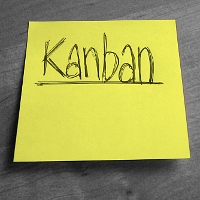
Sometimes Twitter is a mine where you can dig thought-provoking gems. A couple of days ago Alan Shalloway said, as a part of a heated discussion, that:
People who say Kanban isn't about collaboration forget that one of the core practices is improve collaboratively (using models/scientific methods).
I both agree and disagree.
I mean, yes, this is true – collaborative improvements are one of Kanban principles. And yes, the word "collaboratively" is there for a reason. And triple yes, whenever you are setting up the process or improving it you work collaboratively.
At the same time I can't agree with boiling collaboration in Kanban down to "improve collaboratively" only.
One of most canonical examples of improvement introduced by Kanban is on-demand swarming. When either a feature is blocked or we just have bottleneck resulting with full work-queue people swarm over it to get the flow, well, flowing again. I know Kanban doesn't tell you that you should collaborate in such situations but actually introducing limited WIP results in many similar behaviors. People are helping each other. Last time I checked it counted as collaboration, but well, maybe we use different definition of collaboration.
Another, pretty typical, situation I see in Kanban teams is a result of visualization – when team members see that one of their colleagues, for whatever reasons, is coping with multiple work items, they tend to help instead of just starting another feature from backlog. Sounds like collaboration, isn't it?
Then we have complexity of processes we try to cover with Kanban. Despite simple Kanban board we see here and there software development is usually pretty complex process. At the same time we are advised to start simple with Kanban. It means that we often come up with a board which is pretty simplified model of what we are doing. For example, usually testing/quality control stage covers both testing and bug fixing, meaning that most likely at least a couple of people work on a feature at the same time. Collaboratively. With no formal hand-offs.
And when we are at hand-offs, with Kanban we make them visible on Kanban board. We also have incentives to optimize hand-offs, both in terms of a number of them and in terms of time features spend waiting to be picked up by the next person. Fewer hand-offs mean improved collaboration as people need to cover removed formalisms (hand-offs) somehow. And believe me, they do.
We also work collaboratively whenever we are changing the process. I'm yet to meet a team which had this part of Kanban setup just enforced by someone. I'm sure there are such teams out there but, at least now, it is total minority. What more, usually these discussions are launched be team members, e.g. when they don't know where to put an index card, which basically means that the process might need some improvements. This collective decision making process can be called collaboration I guess.
I could probably go further but, by this time, you get the point. Despite Kanban doesn't say collaboration over processes or something alike, thanks to its rules, it really fosters everyday collaboration. Usually it is all about small things: swarming over this blocked feature, quick feedback loops with that one being tested, launching a discussion about adding a column here or changing a limit there.
Collaboration in Kanban isn't about big words and big ideas. It is about tiny everyday actions. But please, don't tell me that Kanban isn't about collaboration. That's just bullshit.
![]()
![]()